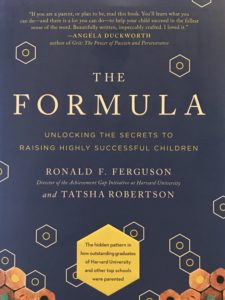 We’ve all heard about parenting styles that can hinder children’s success: the over involved parent, the distracted parent, the super protective parent. But are there parenting styles that can help children become highly successful adults? According to Harvard economist Ronald Ferguson and journalist Tatsha Robertson’s new book The Formula: Unlocking the Secrets to Raising Highly Successful Children, there are, and we can learn what they are and how to use them.
We’ve all heard about parenting styles that can hinder children’s success: the over involved parent, the distracted parent, the super protective parent. But are there parenting styles that can help children become highly successful adults? According to Harvard economist Ronald Ferguson and journalist Tatsha Robertson’s new book The Formula: Unlocking the Secrets to Raising Highly Successful Children, there are, and we can learn what they are and how to use them.
Ferguson, an MIT trained economist who has been teaching at Harvard for over 30 years, has been studying parent involvement in student achievement for many years. He is the director of the Achievement Gap Initiative, which focuses on closing the racial achievement gap. GCP has been following his work for some time; my 2011 interview with him, “Dr. Ronald Ferguson: What Parents Can Do” was one of our first posts. And as award winning journalist Tatsha Robertson interviewed numerous successful people for various articles, she found herself focused on and fascinated by what role parents might have played in their success.
Ferguson and Robertson combined forces to explore this topic more deeply. They conducted extensive interviews of highly successful people (graduates of Harvard and elsewhere) and their parents, in an effort to understand not only what the parents did, but why they parented as they did. Ferguson and Robertson were hoping to find a pattern of behavior. They actually found 8 distinct parental roles that these parents, of varying racial and economic backgrounds, all incorporated into their parenting style. Ferguson and Robertson determined that these eight parental roles, seen again and again, were the “formula for master parenting”.
Here is an overview of the 8 parental roles and how they work:
- The Early Learning Partner lights the fire in young children to learn and develop problem solving skills before they start school. Most of the highly successful children Ferguson and Robertson interviewed could read basic words by the time they started kindergarten, which impressed teachers and started the children’s school years on a very positive note.
- The Flight Engineer works to ensure that the child is getting everything s/he needs in school, and will step in whenever necessary to make sure this continues. (This sounds like Ground Control Parenting!)
- The Fixer makes sure that no opportunity is lost or overlooked, regardless of the parent’s resources. If the parent determines that there is an opportunity his or her child should have access to, s/he won’t stop until a way is found to provide it.
- The Revealer introduces children to worlds beyond their own, again regardless of the family’s income. If they can’t afford to travel to other lands, they go to local museums and libraries and other cultural institutions where children can explore and learn.
- The Philosopher answers children’s deep and thoughtful questions honest and earnestly and encourages them to ask more. They help their children try to understand life and find their purpose.
- The Model gives children behavior to emulate.
- The Negotiator teaches children to advocate for themselves, and how to deal with people who exercise authority and power.
- The GPS Navigational Voice ensures that the parents’ voices will be in their children’s heads well after the kids have left home to pursue their futures.
In addition to identifying these master parenting traits, Ferguson and Robertson sought to understand how master parents got that way. They found that all of the master parents they interviewed were intensely determined to be great parents, and the motivation for this usually came out of something in their own histories. Perhaps they didn’t want to repeat a parenting wrong they witnessed in their own childhood. Perhaps they had a family legacy of some sort which they were determined to pass on to the next generation. They all had a vision of the kind of people they wanted their children to become, and this inspired and guided their parenting.
Want to know more? Me too! I bought the book and am about to dive in, and I suggest you do the same. I found myself nodding in agreement with so many of these parenting roles described above; I can’t wait to read about them in detail, and will post again about this book once I’ve finished it. In the meantime, for a bit more info, you can check out the Ferguson interview in the Harvard Gazette.
Looking forward to learning and talking more about The Formula!





